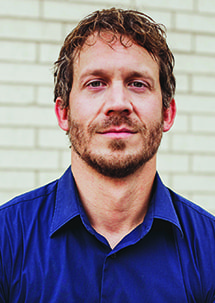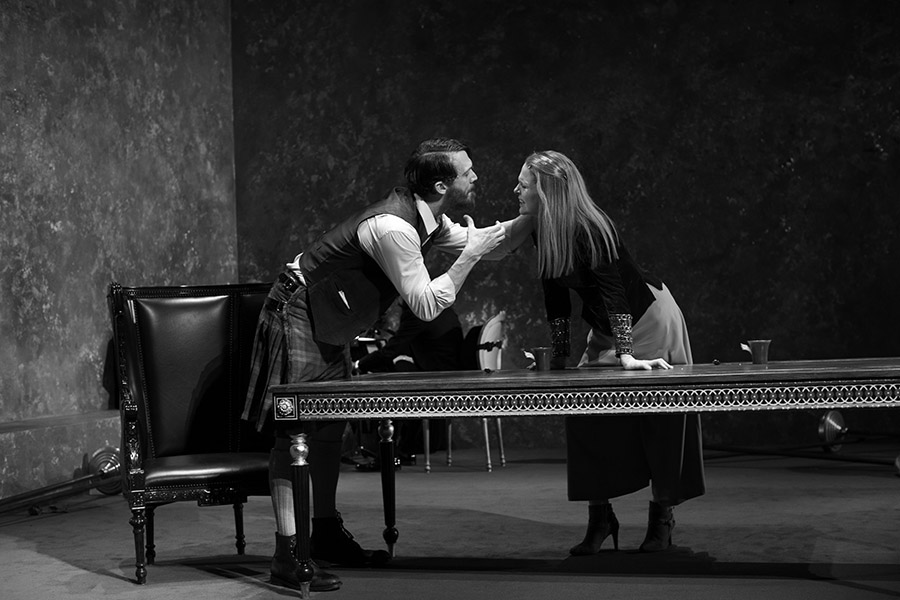Russell Harvard, whose Off-Broadway performances include 2012’s Tribes and this season’s I Was Most Alive With You, made his Broadway debut in 2015 with Deaf West Theatre’s staging of Spring Awakening. Harvard, also known for the film There Will Be Blood and the series “Fargo,” is back on the Main Stem in King Lear through July 7. Monique Holt is a performer, director, Director of Artistic Sign Language, Certified Deaf Interpreter, and Deaf artists advocate and consultant. Among her many credits, in 1999 she played Cordelia in Lear at the Shakespeare Theatre Company in Washington, D.C.

MONIQUE HOLT: What led you to this role in King Lear?
RUSSELL HARVARD: After I read the play, I really liked the Duke of Cornwall, because he has this bizarre psychopath personality, which leads him to gouge out the Earl of Gloucester’s eyes. I never want to be the villain in real life, but to play a villain is an incredible opportunity, and that’s the fun part of being an actor.
Did you have a visceral reaction to the idea of gouging eyes out, since you are a Deaf person who especially cherishes your eyesight?
Oh yes! And to take away everything the Earl of Gloucester would get to see.
What were your biggest challenges in this production?
I contributed the American Sign Language translation (with the assistance of Alexandria Wailes, our Director of Artistic Sign Language), so challenge No. 1 was the language. I am not that familiar with the Shakespearean text. As we translated it into ASL, we had to first understand the meaning behind the lines in order to find the ASL equivalent—and ones that were contemporary to match the tone of the play.
Challenge No. 2 was how I envisioned the Duke of Cornwall and his lip-reading skills. I decided he was very skilled with lip-reading but would need an aide functioning as an interpreter to interpret his lines. The director [Sam Gold] was open to that idea, but to keep things consistent for the audience, it was decided that the aide, also his childhood friend, would interpret in ASL and voice for the Duke.
What made you decide to go into acting?
When I was in third grade, I saw my cousin Mindy Moore performing as the Wicked Witch in The Wizard of Oz at Texas School for the Deaf (TSD). I never imagined my cousin could play so “wicked.” This is maybe why I enjoy playing the villain. From there, I knew I wanted to be an actor.
That year, we were supposed to do a Christmas play: My classmates and I were brainstorming, and I remembered The Wizard of Oz and suggested a new version, Santa Lost in Oz. I told them I wanted to play the Witch, and they told me I couldn’t because I was a boy. I convinced them by saying I could be the boy witch. Decades later, I had the opportunity to direct a show at TSD and returned with a successful Wizard of Oz.
You’ve worked in theatre, film, TV, music, and dance. Which do you enjoy most?
Really I like them all. The bottom line is I enjoy the brainstorming, creation, and collaboration processes… with other people. It’s also nice to work in an environment that incorporates only ASL as the main form of communication. I come from a Deaf family, so that comes naturally to me when information is shared in a similar way. I have worked with all-Deaf casts onstage and in film, but not TV yet. I enjoy theatre where the show evolves and every performance could be different, depending on what happens onstage that night.
I just co-founded Deaf Austin Theatre [in Texas]. When I return home, our goal is to produce our first show by 2020 and develop the next generation of Deaf artists.
As a Deaf actor, which skill did you feel you needed to master more, acting or signing?
Oh! I think we need to hone acting and signing skills equally. Honor the time period, personality, and the style of that time in portraying a character.
Do you think schools like Gallaudet University, your alma mater, and the National Technical Institute for the Deaf should offer “ASL for acting” classes?
As a required course, yes! Including public speaking with a focus on tone, register, and style… I think that would be fantastic. I still have a videotape of “Preservation of the Sign Language” (1913) by George W. Veditz, who was president of the National Association of the Deaf, to view how ASL signs have evolved over the years.
What do you do you hope for the future of the theatre business?
I would love to see an all-Deaf cast. Deaf stories are plentiful. That’s what I really want to see. Even on Broadway with all ASL used onstage, including a Deaf creative team.
If you could do any show, what would it be?
I love musicals. I like dark, raw, raunchy, blood… that’s my fascination. I have two shows I would love to see produced: Rocky Horror Picture Show with an entirely Deaf cast. I would love to play Dr. Frank ‘N’ Furter. If money is not an issue, I would rather do pre-recorded music, or do the score without words, so we can focus on signing the songs. [The other show is] Sweeney Todd.
If you had a chance to talk to your young actor self at the age of 19, what would you tell him?
[Laughs] Wow! As an adult, I am so grateful that I am a “working” actor. Yes, I would tell young Russell to be prepared for my journey in the ongoing battle of staying sober. I realized being sober helped me achieve more clarity in my life. I was dumbfounded how much I got by, but didn’t know I was given so many amazing opportunities. I simply took them for granted. Right now I feel happy, grateful, and blessed for those opportunities.


